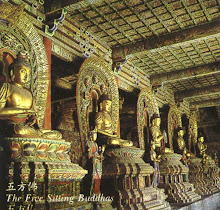(Anguttara Nikaya III, 65)
The Instruction to the Kalamas
Translated from the Pali
by Soma Thera
(The Kalamas of
Kesaputta go to see the Buddha)
1. I heard thus. Once
the Blessed One, while wandering in the Kosala
country with a
large community of bhikkhus, entered a town of the
Kalama people
called Kesaputta. The Kalamas who were inhabitants
of
Kesaputta: "Reverend Gotama, the monk, the son of the Sakyans,
has,
while wandering in the Kosala country, entered Kesaputta. The
good
repute of the Reverend Gotama has been spread
in this way: Indeed,
the Blessed One is thus consummate, fully
enlightened, endowed
with knowledge and practice, sublime, knower
of the worlds,
peerless, guide of tamable men, teacher of divine
and human beings,
which he by himself has through direct knowledge
understood clearly.
He set forth the Dhamma, good in the
beginning, good in
the middle, good in the end, possessed of
meaning and the
letter, and complete in everything; and he
proclaims the holy
life that is perfectly pure. Seeing such
consummate ones is
good indeed."
2. Then the Kalamas
who were inhabitants of Kesaputta went to
where the Blessed One
was. On arriving there some paid homage to
him and sat down on one
side; some exchanged greetings with him
and after the ending
of cordial memorable talk, sat down on one
side; some saluted
him raising their joined palms and sat down on
one side; some
announced their name and family and sat down on one
side; some without
speaking, sat down on one side.
(The Kalamas of
Kesaputta ask for guidance from the Buddha)
3. The Kalamas who
were inhabitants of Kesaputta sitting on one
side said to the
Blessed One: "There are some monks and brahmins,
venerable sir, who
visit Kesaputta. They expound and explain only
their own doctrines;
the doctrines of others they despise, revile,
and pull to pieces.
Some other monks and brahmins too, venerable
sir, come to
Kesaputta. They also expound and explain only their
own doctrines; the
doctrines of others they despise, revile, and
pull to pieces.
Venerable sir, there is doubt, there is
uncertainty in us
concerning them. Which of these reverend monks
and brahmins spoke
the truth and which falsehood?"
(The criterion for
rejection)
4. "It is proper
for you, Kalamas, to doubt, to be uncertain;
uncertainty has
arisen in you about what is doubtful. Come,
Kalamas. Do not go
upon what has been acquired by repeated
hearing; nor upon
tradition; nor upon rumor; nor upon what is in a
scripture; nor upon
surmise; nor upon an axiom; nor upon specious
reasoning; nor upon a
bias towards a notion that has been pondered
over; nor upon
another's seeming ability; nor upon the
consideration, 'The
monk is our teacher.' Kalamas, when you
yourselves know:
'These things are bad; these things are blamable;
these things are
censured by the wise; undertaken and observed,
these things lead to
harm and ill,' abandon them.
(Greed, hate, and
delusion)
5. "What do you
think, Kalamas? Does greed appear in a man for his
benefit or
harm?" -- "For his harm, venerable sir." -- "Kalamas,
being given to greed,
and being overwhelmed and vanquished
mentally by greed,
this man takes life, steals, commits adultery,
and tells lies; he
prompts another too, to do likewise. Will that
be long for his harm
and ill?" -- "Yes, venerable sir."
6. "What do you
think, Kalamas? Does hate appear in a man for his
benefit or
harm?" -- "For his harm, venerable sir." -- "Kalamas,
being given to hate,
and being overwhelmed and vanquished mentally
by hate, this man
takes life, steals, commits adultery, and tells
lies; he prompts
another too, to do likewise. Will that be long
for his harm and
ill?" -- "Yes, venerable sir."
7. "What do you
think, Kalamas? Does delusion appear in a man for
his benefit or
harm?" -- "For his harm, venerable sir." --
"Kalamas, being
given to delusion, and being overwhelmed and
vanquished mentally
by delusion, this man takes life, steals,
commits adultery, and
tells lies; he prompts another too, to do
likewise. Will that
be long for his harm and ill?" -- "Yes,
venerable sir."
8. "What do you
think, Kalamas? Are these things good or bad?" --
"Bad, venerable
sir" -- "Blamable or not blamable?" -- "Blamable,
venerable sir."
-- "Censured or praised by the wise?" --
"Censured,
venerable sir." -- "Undertaken and observed, do these
things lead to harm
and ill, or not? Or how does it strike you?"
-- "Undertaken
and observed, these things lead to harm and ill.
Thus it strikes us
here."
9. "Therefore,
did we say, Kalamas, what was said thus, 'Come
Kalamas. Do not go
upon what has been acquired by repeated
hearing; nor upon
tradition; nor upon rumor; nor upon what is in a
scripture; nor upon surmise;
nor upon an axiom; nor upon specious
reasoning; nor upon a
bias towards a notion that has been pondered
over; nor upon
another's seeming ability; nor upon the
consideration,
"The monk is our teacher." Kalamas, when you
yourselves know:
"These things are bad; these things are blamable;
these things are
censured by the wise; undertaken and observed,
these things lead to
harm and ill," abandon them.'
(The criterion for
acceptance)
10. "Come,
Kalamas. Do not go upon what has been acquired by
repeated hearing; nor
upon tradition; nor upon rumor; nor upon
what is in a
scripture; nor upon surmise; nor upon an axiom; nor
upon specious
reasoning; nor upon a bias towards a notion that has
been pondered over;
nor upon another's seeming ability; nor upon
the consideration,
'The monk is our teacher.' Kalamas, when you
yourselves know:
'These things are good; these things are not
blamable; these
things are praised by the wise; undertaken and
observed, these
things lead to benefit and happiness,' enter on
and abide in them.
(Absence of greed,
hate, and delusion)
11. "What do you
think, Kalamas? Does absence of greed appear in a
man for his benefit
or harm?" -- "For his benefit, venerable sir."
-- "Kalamas,
being not given to greed, and being not overwhelmed
and not vanquished
mentally by greed, this man does not take life,
does not steal, does
not commit adultery, and does not tell lies;
he prompts another
too, to do likewise. Will that be long for his
benefit and happiness?"
-- "Yes, venerable sir."
12. "What do you
think, Kalamas? Does absence of hate appear in a
man for his benefit
or harm?" -- "For his benefit, venerable sir."
-- "Kalamas,
being not given to hate, and being not overwhelmed
and not vanquished mentally
by hate, this man does not take life,
does not steal, does
not commit adultery, and does not tell lies;
he prompts another
too, to do likewise. Will that be long for his
benefit and
happiness?" -- "Yes, venerable sir."
13. "What do you
think, Kalamas? Does absence of delusion appear
in a man for his
benefit or harm?" -- "For his benefit, venerable
sir." --
"Kalamas, being not given to delusion, and being not
overwhelmed and not
vanquished mentally by delusion, this man does
not take life, does
not steal, does not commit adultery, and does
not tell lies; he
prompts another too, to do likewise. Will that
be long for his
benefit and happiness?" -- "Yes, venerable sir."
14. "What do you
think, Kalamas? Are these things good or bad?" --
"Good, venerable
sir." -- "Blamable or not blamable?" -- "Not
blamable, venerable
sir." -- "Censured or praised by the wise?" --
"Praised,
venerable sir." -- "Undertaken and observed, do these
things lead to
benefit and happiness, or not? Or how does it
strike you?" --
"Undertaken and observed, these things lead to
benefit and
happiness. Thus it strikes us here."
15. "Therefore,
did we say, Kalamas, what was said thus, 'Come
Kalamas. Do not go
upon what has been acquired by repeated
hearing; nor upon
tradition; nor upon rumor; nor upon what is in a
scripture; nor upon
surmise; nor upon an axiom; nor upon specious
reasoning; nor upon a
bias towards a notion that has been pondered
over; nor upon
another's seeming ability; nor upon the
consideration,
"The monk is our teacher." Kalamas, when you
yourselves know:
"These things are good; these things are not
blamable; these
things are praised by the wise; undertaken and
observed, these
things lead to benefit and happiness," enter on
and abide in them.'
(The Four Exalted
Dwellings)
16. "The
disciple of the Noble Ones, Kalamas, who in this way is
devoid of coveting,
devoid of ill will, undeluded, clearly
comprehending and
mindful, dwells, having pervaded, with the
thought of amity, one
quarter; likewise the second; likewise the
third; likewise the
fourth; so above, below, and across; he
dwells, having
pervaded because of the existence in it of all
living beings,
everywhere, the entire world, with the great,
exalted, boundless thought
of amity that is free of hate or
malice.
"He lives,
having pervaded, with the thought of compassion, one
quarter; likewise the
second; likewise the third; likewise the
fourth; so above,
below, and across; he dwells, having pervaded
because of the
existence in it of all living beings, everywhere,
the entire world,
with the great, exalted, boundless thought of
compassion that is
free of hate or malice.
"He lives,
having pervaded, with the thought of gladness, one
quarter; likewise the
second; likewise the third; likewise the
fourth; so above,
below, and across; he dwells, having pervaded
because of the
existence in it of all living beings, everywhere,
the entire world,
with the great, exalted, boundless thought of
gladness that is free
of hate or malice.
"He lives,
having pervaded, with the thought of equanimity, one
quarter; likewise the
second; likewise the third; likewise the
fourth; so above,
below, and across; he dwells, having pervaded
because of the
existence in it of all living beings, everywhere,
the entire world,
with the great, exalted, boundless thought of
equanimity that is
free of hate or malice.
(The Four Solaces)
17. "The
disciple of the Noble Ones, Kalamas, who has such a
hate-free mind, such
a malice-free mind, such an undefiled mind,
and such a purified
mind, is one by whom four solaces are found
here and now.
"'Suppose there
is a hereafter and there is a fruit, result, of
deeds done well or
ill. Then it is possible that at the
dissolution of the
body after death, I shall arise in the heavenly
world, which is
possessed of the state of bliss.' This is the
first solace found by
him.
"'Suppose there
is no hereafter and there is no fruit, no result,
of deeds done well or
ill. Yet in this world, here and now, free
from hatred, free
from malice, safe and sound, and happy, I keep
myself.' This is the
second solace found by him.
"'Suppose evil
(results) befall an evil-doer. I, however, think of
doing evil to no one.
Then, how can ill (results) affect me who do
no evil deed?' This
is the third solace found by him.
"'Suppose evil
(results) do not befall an evil-doer. Then I see
myself purified in
any case.' This is the fourth solace found by
him.
"The disciple of
the Noble Ones, Kalamas, who has such a hate-free
mind, such a
malice-free mind, such an undefiled mind, and such a
purified mind, is one
by whom, here and now, these four solaces
are found."
"So it is,
Blessed One. So it is, Sublime one. The disciple of the
Noble Ones, venerable
sir, who has such a hate-free mind, such a
malice-free mind,
such an undefiled mind, and such a purified
mind, is one by whom,
here and now, four solaces are found.
"'Suppose there
is a hereafter and there is a fruit, result, of
deeds done well or
ill. Then it is possible that at the
dissolution of the
body after death, I shall arise in the heavenly
world, which is
possessed of the state of bliss.' This is the
first solace found by
him.
"'Suppose there
is no hereafter and there is no fruit, no result,
of deeds done well or
ill. Yet in this world, here and now, free
from hatred, free
from malice, safe and sound, and happy, I keep
myself.' This is the
second solace found by him.
"'Suppose evil
(results) befall an evil-doer. I, however, think of
doing evil to no one.
Then, how can ill (results) affect me who do
no evil deed?' This
is the third solace found by him.
"'Suppose evil
(results) do not befall an evil-doer. Then I see
myself purified in
any case.' This is the fourth solace found by
him.
"The disciple of
the Noble Ones, venerable sir, who has such a
hate-free mind, such
a malice-free mind, such an undefiled mind,
and such a purified
mind, is one by whom, here and now, these four
solaces are found.
"Marvelous,
venerable sir! Marvelous, venerable sir! As if,
venerable sir, a
person were to turn face upwards what is upside
down, or to uncover
the concealed, or to point the way to one who
is lost or to carry a
lamp in the darkness, thinking, 'Those who
have eyes will see
visible objects,' so has the Dhamma been set
forth in many ways by
the Blessed One. We, venerable sir, go to
the Blessed One for
refuge, to the Dhamma for refuge, and to the
Community of Bhikkhus
for refuge. Venerable sir, may the Blessed
One regard us as lay
followers who have gone for refuge for life,
from today."
--------------------------------------------------------------------------------
Note: Bhikkhu Bodhi's
essay, "A Look at the Kalama Sutta", offers some
important insights
into this sutta, clarifying some points that have
recently become
muddled in various contemporary teachings.
Revised: Fri 19
February 1999 , Access-to-Insight
http://world.std.com/~metta/canon/anguttara/an3-65b.html











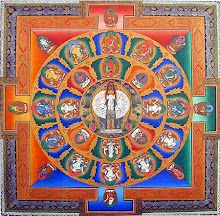




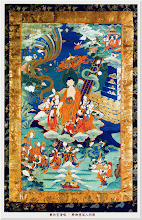

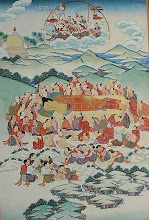


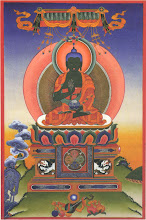




.jpg)

